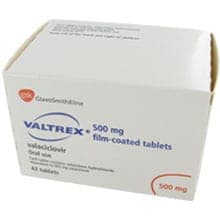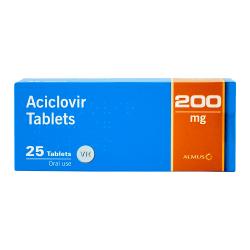Login to your account
- Prescription included
- Genuine medication
- All-inclusive service - No hidden fees
- Free next-day delivery
Genital Herpes
Get genital herpes medication with an online prescription
Genital herpes is a highly contagious and common sexually transmitted infection (STI) caused by the herpes simplex virus. The virus causes itchy red genital sores and fluid blisters on the skin. Unfortunately, the virus is not curable and can lay dormant in some for many years. However, with prescription antiviral medicines, the condition is extremely manageable.
On this page
What is genital herpes? How do I get genital herpes? What are the symptoms of genital herpes? What happens if I leave genital herpes untreated? How do I test for genital herpes? How do I treat genital herpes? How do I prevent getting genital herpes? How do I buy genital herpes treatment online?Available Treatment(s)

- Works quickly for symptomatic relief from cold sores, genital herpes and shingles
- Can be taken as a preventative treatment for cold sores and genital herpes
- Easy to take tablet form

- Effectively treats herpes outbreaks
- For genital herpes, cold sores and shingles
- Easy-to-take tablets
What is genital herpes?
Genital herpes is a strain of the herpes simplex virus (HSV) and a sexually transmitted infection (STI) that can lay dormant the vast majority of the time for many people. When revealing its symptoms, these come in the form of discomforting and sometimes painful blisters (lesions) that appear on and around the genitals but can also appear on the mouth and thighs as well.
There are several types of herpes. Genital herpes belongs to a group of viruses known as the herpes simplex viruses, and is most commonly caused by the specific strain of it known as herpes simplex virus type-2 (HSV-2). The other main type is herpes simplex virus type-1 (HSV-1) which largely causes a similar condition called cold sores, otherwise known as oral herpes or herpes labialis.
Being a viral infection, the genital herpes virus never leaves your body which makes it a prevalent STI, especially among sexually active adults. However, this doesn't mean the condition is difficult and life-altering. The symptoms tend to become increasingly more manageable over time and can be particularly infrequent.
How do I get genital herpes?
Genital herpes is highly contagious and most commonly passed on from one person to the next through unprotected sexual intercourse. This could be transmitted through vaginal sex, anal sex or oral sex, or through any sexual contact with the genitals of a person with active symptoms.
Rarely, you can also contract genital herpes from receiving oral sex from someone with an active bout of cold sores as genital herpes can sometimes be caused by HSV-1.
Whilst wearing barrier contraception like a male condom can significantly reduce your chances of getting herpes, it can still be passed onto you, especially if lesions (blisters) are present.
However, symptoms are not always visible with this infection, which means that you don't necessarily have to have unprotected penetrative sex with an infected person to catch the HSV-2 virus.
What triggers genital herpes symptoms?
The herpes virus can never be completely cured, but that doesn’t mean you will experience active symptoms all the time. For many, the virus remains dormant for the majority of the time.
It is not entirely known what causes the virus to become active again and trigger an outbreak. However, research has shown that factors affecting your immune system and wellbeing mean your body is less able to keep the virus active.
Risk factors for a genital herpes episode include:
- weakened immune system
- tiredness and fatigue
- stress or anxiousness
- excessive alcohol consumption
- particular dietary choices
- exposing the genitals to direct sunlight
- friction around the genital area
- hormonal changes (i.e menstrual cycle in women)
A weakened immune system due to a common cold or something more serious like chemotherapy can give the virus an opportunity to spread. In terms of alcohol, this alters your body's balance especially in terms of sugar intake, which can promote an outbreak. This is the same for sugar intake in your diet. Some people find keeping a mental or physical note on when an outbreak occurs can correlate with one of the above triggers.
The severity and frequency of these outbreaks tends to diminish over time. Others can be luckier, and won't experience symptoms for months or even years. The regularity of these outbreaks differs from person to person.
What are the symptoms of genital herpes?
Genital herpes symptoms can develop fast with discomforting and sometimes painful red blisters (lesions) and skin ulcers forming in the genital area, the thighs, anus and rectum. The virus remains in a nearby nerve, so recurrent outbreaks will always occur in the same place.
Most will typically feel a tingling or burning sensation before blisters appear, known as the ‘prodrome phase’. Some people also experience flu-like symptoms during their first episode of genital herpes such as:
- fever
- headache
- swollen lymph nodes
- nausea
After a few hours of prodrome symptoms, herpes sores develop. These fluid-filled blisters are itchy and can also be painful when they burst, leaving open sores that are easily irritated. You may also experience pain when you urinate or unusual vaginal discharge during active symptoms.
Once the blisters ooze, they dry and scab over after a few days but for some blisters can take 2 - 4 weeks to heal. They may crack and bleed at this stage before sores have fully healed.
Additionally, genital herpes go through what is known as a 'shedding phase', which means that the virus is active on the surface of the skin. Symptoms are not often visible during this phase, but the virus can still be passed on through skin-to-skin contact, a phenomenon known as asymptomatic shedding.
A genital herpes infection can appear like razor burn, ingrown hairs but also like several skin conditions including jock itch, genital warts and other STIs. For that reason, it’s important to get tested as soon as you notice symptoms, especially if it’s your first outbreak of genital herpes.
Please note: the below images are explicit in nature.
What happens if I leave genital herpes untreated?
As with many STIs, leaving genital herpes untreated can cause several complications including:
- bladder problems such as urethritis (inflammation of the urethra)
- pelvic inflammatory disease in women (PID)
- proctitis (inflammation of the rectum)
If you are pregnant or breastfeeding, you can also transmit the virus to your newborn which is a condition known as neonatal herpes. It mostly occurs in women who contract the virus for the first time whilst pregnant, and it is passed onto the baby at the time of delivery or from skin-to-skin contact with them.
It may be uncomfortable for most to speak to your healthcare provider about your intimate health, but the quicker you do so, the quicker you can get treatment and significantly reduce the risk of any issues.
How do I test for genital herpes?
Genital herpes very rarely displays any symptoms like many STDs (sexually transmitted diseases) such as chlamydia, syphilis and gonnorhoea. In fact, the CDC (Centers For Disease Control and Prevention) estimate that over 80% of those with the herpes virus don't even know they have it. This is why testing for herpes can be extremely difficult.
If you do have a sore present, you can go to a sexual health clinic or GUM (genitourinary medicine) clinic where they will take a sample of the sore during a swab test. Your GP may also be able to test for some STIs, but you will have to check before booking an appointment as not all do.
If you do not have visible sores or it has been a while since you noticed sores, you may need to do a blood test to see whether they can detect herpes virus antibodies.
How do I treat genital herpes?
Genital herpes is a common sexually transmitted virus and although there is no cure, you can still reduce the length of an outbreak by up to two-thirds by opting for medication or treatment.
This will also make the symptoms far more bearable, offering relief within 24 hours. When treating genital herpes, cold sores or shingles, it is important to start your chosen treatment as soon as possible for maximum effectiveness. This is why pinpointing triggers and keeping a small supply handy is recommended. Some find all or occasional outbreaks to be mild, so your GP may suggest not using treatment at all.
Prescription medication
Antiviral treatments such as Aciclovir (Acyclovir), Valaciclovir (Valtrex) and Famciclovir (Famvir) available on prescription are clinically proven to alleviate uncomfortable symptoms of genital herpes within one day of starting the course.
They work by attacking the virus cells, preventing the virus from multiplying whilst boosting the body’s immune system to fight off the active virus. This forces the virus into an inactive state, significantly reducing the severity and length of the outbreak.
If you’re prone to frequent outbreaks or have a weakened immune system, then you may require suppressive therapy to keep genital herpes bouts at bay. This involves longer courses of antiviral treatment, typically over 6-12 months.
What else can I do to help with symptoms?
Self-help options can help relieve the unpleasant symptoms and prevent spreading the infection, this includes:
- keeping sores clean to avoid infection such as by using plain or salt water
- not having any sex, including anal or oral, until sores have completely healed
- avoid touching your sores unless applying any cream, in which case wash your hands thoroughly after
- applying an ice pack wrapped in a cloth or flannel onto the sores to relieve any itching
- petroleum jelly (vaseline) is easily obtainable from your pharmacy and can coat and help the sores
- wearing loose and comfortable clothing and cotton underwear to prevent the blisters from irritating
- drinking plenty of water will help you urinate without pain if this is a troublesome symptom for you
How do I prevent getting genital herpes?
Wearing barrier contraception like a male condom doesn't grant you complete immunity, however it can significantly reduce your chance of contracting the STI, especially if the virus is confined to the genitalia, as wearing a condom is 99% effective on average for all STIs when used correctly.
As well as practising safe sex by using a condom, you can refrain from sexual intercourse and intimate touching when sores, blisters and lesions are present or initial symptoms such as tingling occurs, as this is when the virus is most contagious. This is also the case for cold sores and kissing. You should also not share sex toys.
You should also always be open about your sexual history with your sexual partners. This prevents you potentially giving them the virus as well as encouraging them to get tested where appropriate.
Once you have genital herpes, this can be managed by monitoring triggers.Triggers can vary depending on the individual and can include cutting back on alcohol or managing stress. This can act as an effective prevention when limiting recurrent outbreaks on the virus.
How do I buy genital herpes treatment online?
You can buy three different antiviral medications for the treatment of genital herpes at euroClinix. This includes Aciclovir, Valaciclovir and Famciclovir which all work to quickly treat genital herpes symptoms. All you have to do is fill out a quick online consultation form which will be reviewed by one of our doctors. Once they have approved you for treatment, your medication will be shipped discreetly to you with free next-day delivery.
Further reading

The Effects of Alcohol on Antibiotics: Complete Safety Guide
Reviewed by Dr. Caroline Fontana
5 foods to eat while on antibiotics
Reviewed by Dr. Caroline Fontana
Burning sensations after sex: causes, treatments and when...
Reviewed by Dr. Caroline Fontana
Select
medicationFill out a short
medical formDoctor issues
prescriptionMedication sent
from pharmacy




